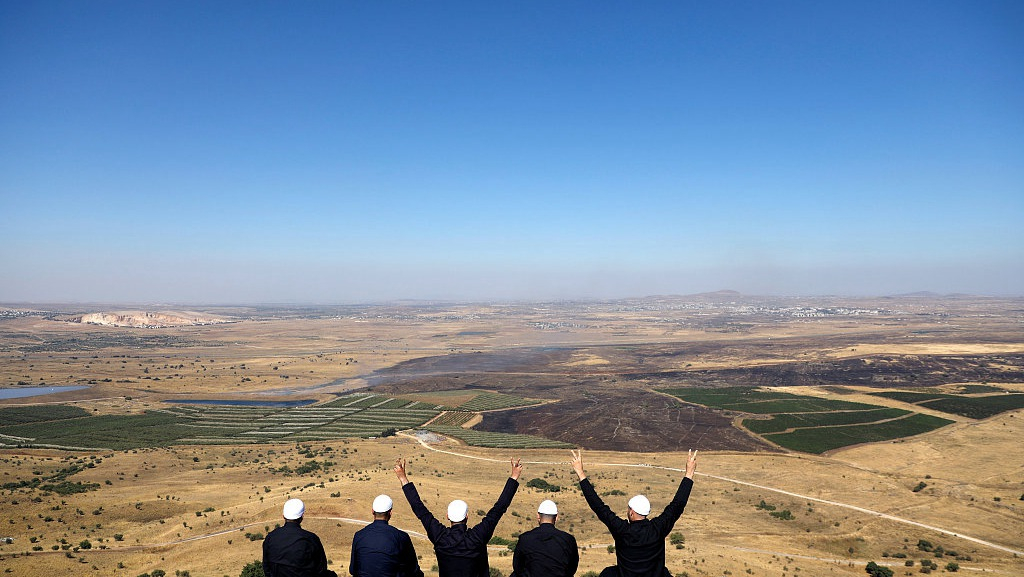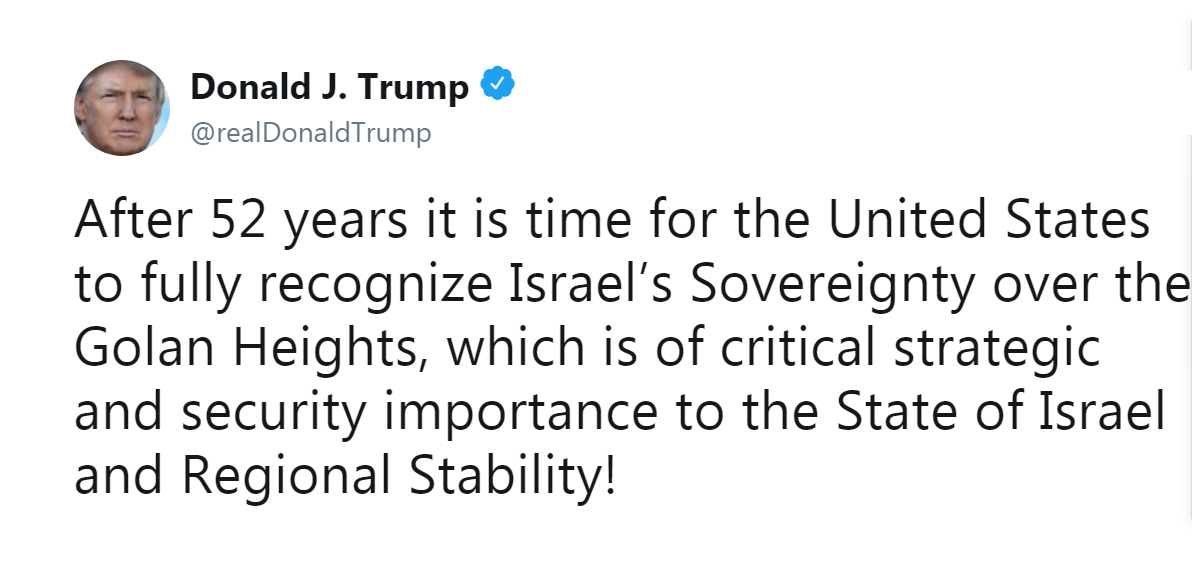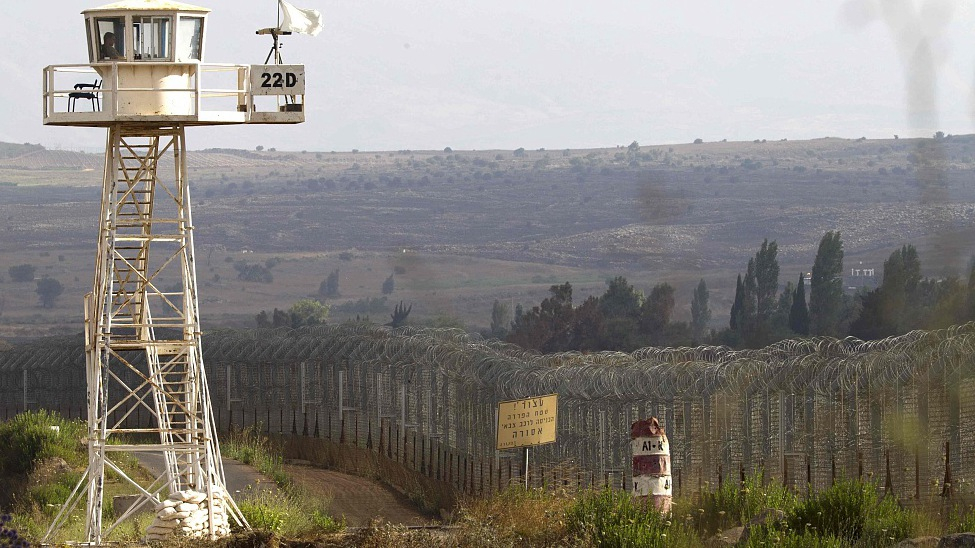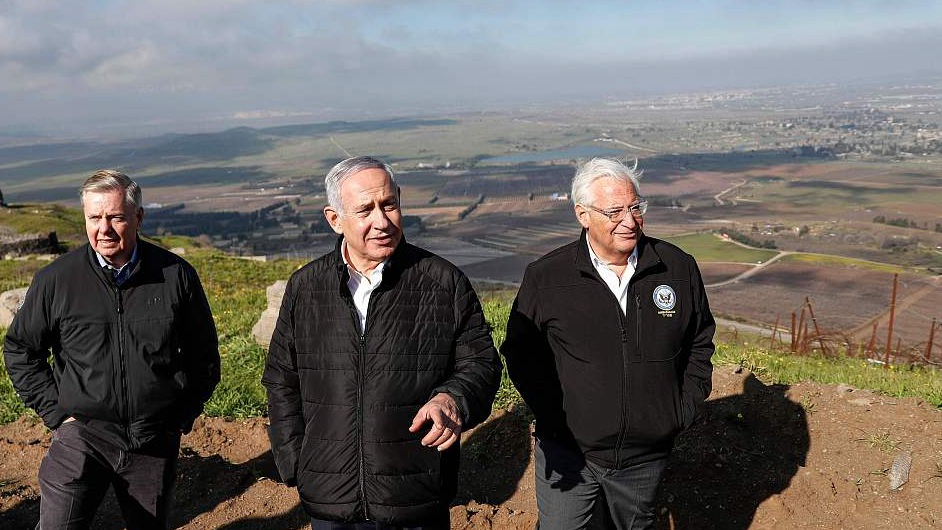
Opinion
21:26, 22-Mar-2019
Trump's illegal recognition of Golan Heights
Updated
09:20, 23-Mar-2019
Tom Fowdy

Editor's note: Tom Fowdy, who graduated from Oxford University's China Studies Program and majored in politics at Durham University, writes about international relations focusing on China and the Democratic People's Republic of Korea. The article reflects the author's views, and not necessarily those of CGTN.
In 1967, the state of Israel responded decisively to preemptive attacks by its Arab neighbors and opened up what is known as the "Six Day War" - during the conflict, the Israelis overpowered a coalition of neighboring countries led by Egypt's Gamal Abdel-Nasser, claiming swathes of territory in a conflict which would eventually accumulate in Cairo's recognition of the state's existence.
In the process, however, Israel formally annexed a region to its north which was a legally recognized territory of Syria, what is referred to as "Golan Heights". Tel Aviv cites its need to maintain the region for security concerns, owing to its longstanding and still unresolved enmity with Damascus which continues to the present day. Despite this, the international community does not recognize the territory as rightfully belonging to Israel, continuing to affirm Syria's sovereign right to the area.
This, however, has not stopped U.S. President Donald Trump, who earlier tweeted that he now recognizes Israel's claim over its sovereignty.
Trump tweeted: "After 52 years it is time for the U.S. to fully recognize Israel's Sovereignty over the Golan Heights, which is of critical strategic and security importance to the State of Israel and Regional Stability!" Commentators noted that the move "tore up decades of U.S. policy."
However, for Trump to resort to such convention that breaks unilateralism on the matter of Israel is not surprising, especially given his controversial recognition of Jerusalem as the country's true capital in 2017.
The motives for the move are quite clear in his tweet, it is in the strategic interests of the U.S. to do so. Squaring off on a regional standoff against Iran, as well as in Syria itself, he is happy to consolidate Israel's continuing military advantage.
In the process, however, Trump is serving to further tear up regional stability, undermining Israel-Arab peace dialogue and further spreading the flame of extremism throughout the region.

Screenshot from Twitter.
Screenshot from Twitter.
The Donald Trump administration has been typical of Republican presidencies in its bid to offer near unconditional backing to the Israeli state, often enthused by the more religious voices within the GOP.
Yet, the president has gone further than any of his predecessors in his willingness to near dismiss talk of a "two-state solution" outright. Since taking office, Trump has unilaterally recognized Israel's claim over East Jerusalem, cut off all aid to Palestinian people and given Benjamin Netanyahu a free rein on settlement building, something that the Obama administration was becoming critical of.
Recognizing Israel's annexation of the Golan Heights, on random and unilateral basis, is just the latest in a series of moves bound to be extremely provocative to the Arab people.
There is, of course, foreign policy logic to it which adds meaning to his decision. Trump is soft on Israel but tough on Iran.

A United Nations peacekeeper sitting in a watchtower near the Quneitra crossing in the demilitarized United Nations Disengagement Observer Force (UNDOF) zone. /VCG Photo
A United Nations peacekeeper sitting in a watchtower near the Quneitra crossing in the demilitarized United Nations Disengagement Observer Force (UNDOF) zone. /VCG Photo
The U.S. is entangled in a strategic rivalry against Tehran for regional influence, which includes Syria itself. Over the past few years, the "rebel" element of the war in Syria, funded by the U.S. and allies, has been pushed back by the Iranian funded Hezbollah and other militia groups, fighting on the side of Bashar Al-Assad.
This involved the reclamation of a territory near the Golan Heights border, as well as incursions into it. This has always been sensitive for Israel, who have repeatedly conducted strikes to destroy key weapons facilities, as well as to inhibit the Iranian forces they see as hostile.
Thus, in recognizing their claim to the Golan Heights, the Trump administration is offering a strategic and security incentive to Tel Aviv. If the U.S. recognizes that given territory, it acts as a strategic deterrent against such attacks and strengthens Israel's hand in the regional struggle.

U.S. Senator Lindsey Graham (L) is accompanied by Israeli Prime minister Benjamin Netanyahu (C) and U.S. Ambassador to Israel David Friedman (R) during a visit to the border between Syria and the Israeli-annexed Golan Heights, March 21, 2019. /VCG Photo
U.S. Senator Lindsey Graham (L) is accompanied by Israeli Prime minister Benjamin Netanyahu (C) and U.S. Ambassador to Israel David Friedman (R) during a visit to the border between Syria and the Israeli-annexed Golan Heights, March 21, 2019. /VCG Photo
However, that doesn't make it right. To unilaterally support annexation of territory from one country to the other is against international law, and it isn't recognized by anyone else.
Washington is not treating the sovereignty of Syria with due respect. To the north, it has thousands of troops stationed without a mandate, of which the U.S. system has fought hard to resist Trump's withdrawal. Similarly, endorsing annexation shows contempt for international norms and territorial integrity. In other words, it is okay to break the rules if it is in Washington's strategic interest to do so.
This will have consequences for the region. By emboldening Israel and giving it less incentive to negotiate with its neighbors, regional peace and stability are being undermined.
The lavish willingness to give the country any territory it desires without a cost and the negligent attitude toward Palestinians will serve throughout the Islamic world to fervor extremism, terrorism, and violence.
This is without even pausing to consider how 70 years of U.S. policy in this region of the world has already served to unleash evil ideologies and unprecedented levels of causalities. Regardless of the struggle with Iran, unilateralism in the Middle East is a danger for the whole world.
(If you want to contribute and have specific expertise, please contact us at opinions@cgtn.com.)

SITEMAP
Copyright © 2018 CGTN. Beijing ICP prepared NO.16065310-3
Copyright © 2018 CGTN. Beijing ICP prepared NO.16065310-3